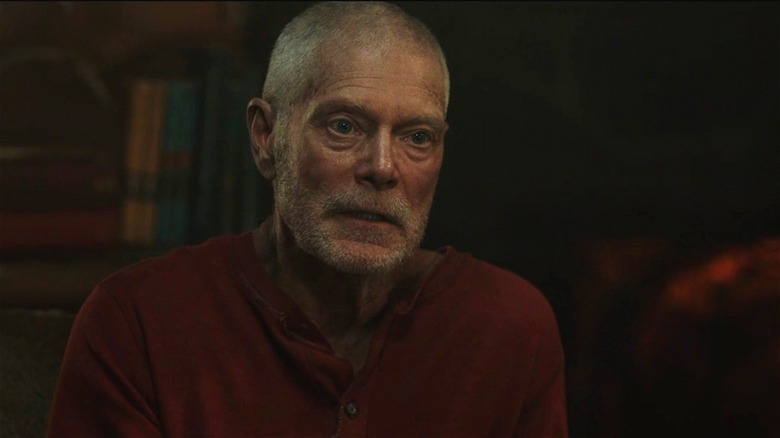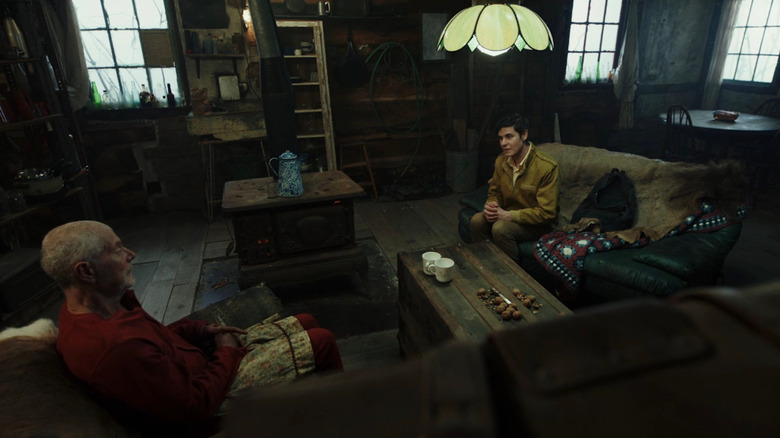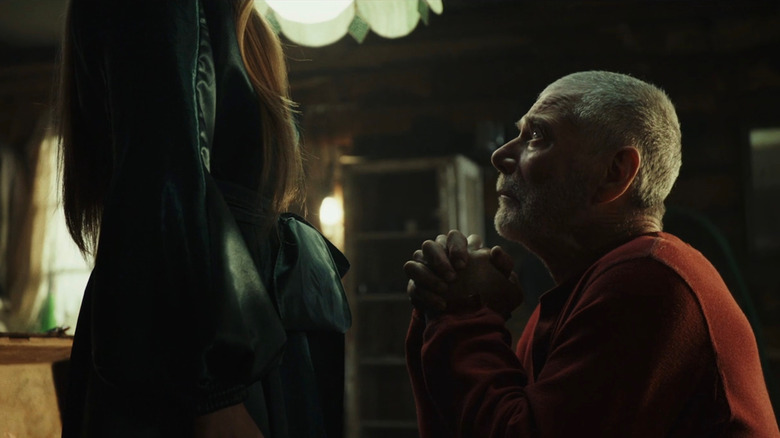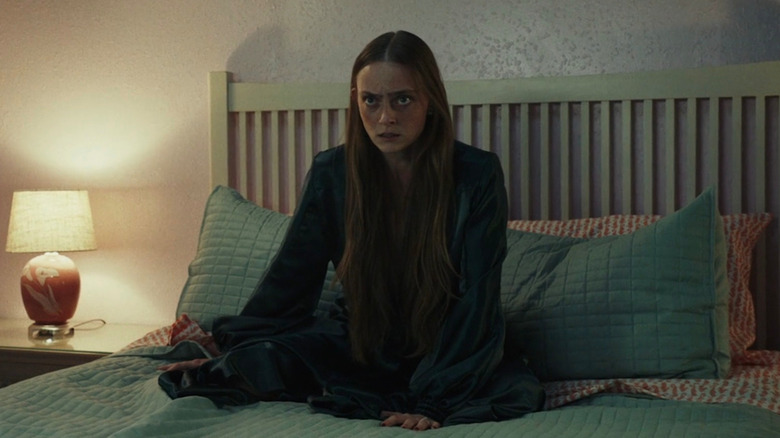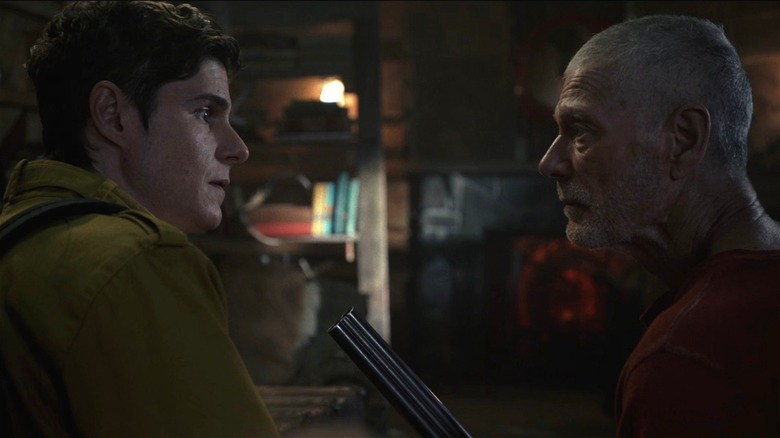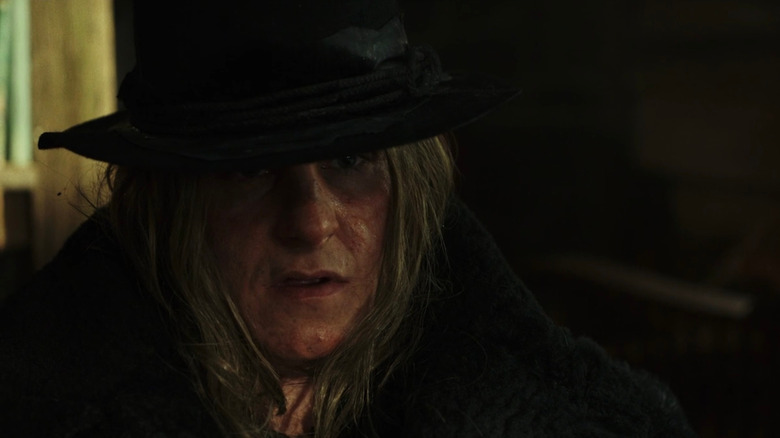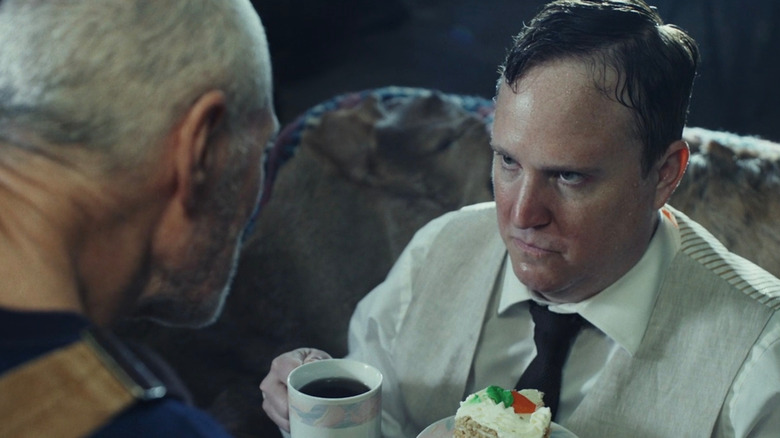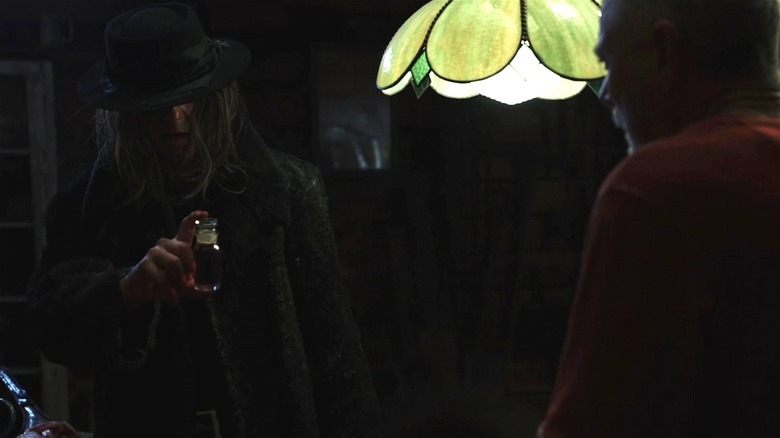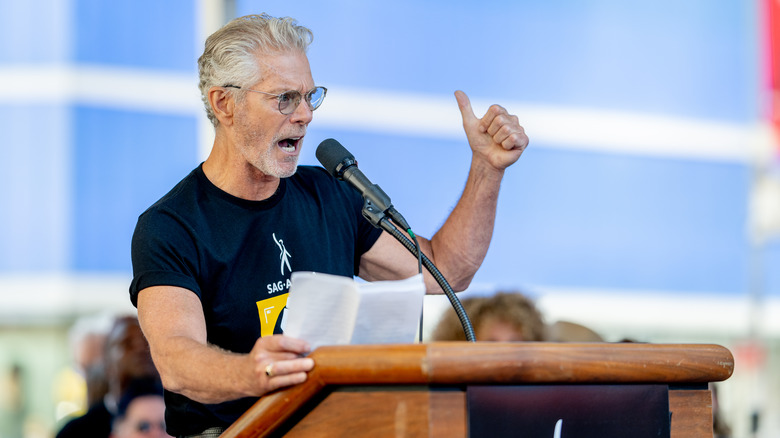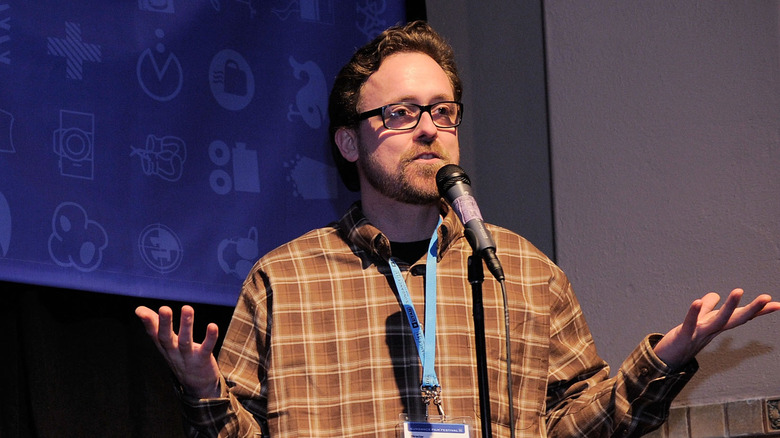The Ending Of Old Man (2022) Explained
There's something otherworldly, and if we're honest, a bit unnerving about an old log cabin in the woods with smoke coming from its chimney. What should be seen as a quaint and comforting retreat from the madness of crowds and ills of civilization is all too often the domain of a witch or a killer — or even a portal into a realm of neverending horror. At least it is in fairytales and films. Director Lucky McKee uses the trope of an unhinged outsider living in a remote cabin to great effect in his 2022 movie "Old Man." Stephen Lang is on fire as the title character, who keeps both the hapless hiker Joe (Marc Senter) and the audience on the edge of their seats with his paranoid, psychotic, and powerhouse performance.
"Old Man" has no star-studded cast, special effects, or stunning locations to keep the audience sidetracked or engaged for the duration. What it does have is two actors on top of their game, some cracking dialogue, and a director looking to do something different. As McKee explained to ComingSoon.net, working within the confines of a small space excited him because he wondered if the interaction between two characters and their constant probing of each other could grab and hold the audience's attention.
"Old Man" not only keeps the audience guessing but pays off their commitment with a tasty little twist that makes you want to rewind to the beginning and go again. Let's take another trip to the cabin and uncover what the ending of "Old Man is really all about.
What you need to remember about the plot of Old Man
"Old Man" begins with the title character waking from a nightmare and angrily lurching around his cabin looking for what we presume is his dog, Rascal, who has gone walkabout. Stephen Lang's character is unnerving from the get-go, not just because he's dressed in an outfit that resembles a red prison jumpsuit from the Depression era, but because of the threats he begins to mutter about his pet dog. As he paces, the old man rants that the penalty for leaving him is death. He barks that when Rascal returns he'll throw him in the fire, pick his bones clean, and wash it down with a little hooch before peeing on his ashes. It's clear he's not well, and has abandonment issues.
Into this cauldron of simmering menace walks Joe, a hiker who has lost his way and come to the cabin seeking help. What he gets is a shotgun in his face and accusations that he is either a serial killer or has been sent by the old man's wife on a mission of ill intent. After being soundly interrogated by the old man, Joe reveals marital and employment troubles led him back to the wild country where he used to feel safe as a boy — yet he has no real recollection of how he came to find the cabin. The two characters settle into easy conversation but the old man continues to alarm Joe with his erratic behavior and stories until he finally flees the cabin and Rascal, who is not a dog but a kind of grizzly outlaw figure, returns. It's at this point things get really interesting.
What happened at the end of Old Man
When Rascal (also played by Marc Senter) enters proceedings, looking like a character dragged screaming from the darkest bowels of the Old West, the old man's persona changes from alpha male to a beaten and broken beta in the blink of an eye. Rascal is far from a scolded dog, but instead a vicious bully who has been out hunting for food. Whimpering like a wounded animal, the old man asks Rascal what he's done with Joe. When the old man threatens to shoot Rascal unless he tells him, the cowboy challenges his strength before snatching the gun. He then calls the old man weak, and says "It's no wonder she left you." Rascal then says he's tired of reminding the old man what really happened and offers him a bottle containing water from the fabled purple lake.
The old man drinks and a box in the room opens by the interior push of a woman's hand. Rascal forces him to enter the box, and the old man steps into a past he has been running frantically from. It's revealed that Joe was simply a younger version of the old man who killed his wife (Liana Wright-Mark) and her lover, a Bible salesman (Patch Darragh). Upon returning to the present, the old man sees the ghost of his butchered wife standing in the box and begs her forgiveness, to which she replies, "It don't work that way."
The movie ends with Rascal saying, "You're looking tired old man. You need to rest now." The beaten old man climbs into bed and Rascal says, "I'll come back later, I always do." The final shot sees the old man falling asleep, waking from a nightmare, and crying out for Rascal — and the cycle begins again.
What the end of Old Man means
In a bid to find some sort of salvation and forgiveness for killing his wife and her lover, the old man has conjured up a younger version of himself from his imagination. Joe the hiker is simply a projection of the old man in a more idealized and innocent form. The old man holds conversations and asks questions of Joe in a search for understanding and atonement of his crimes. He congratulates Joe on working for a living and doing the right thing, because he is enhancing the positives he believes can be found in his own character. However, the old man is still unable to face the full weight of his actions and hides from them in half-truths, fairytales, imaginary scenarios, and bravado.
The old man will stay perpetually trapped in the cabin in the woods, which is a metaphor for a mental prison of his own making, as long as he continues to run from his actions. The ending symbolizes how the power of denial can shape reality and how the worst hells are the ones we create for ourselves. When the old man's torment is over at the end of the film, in a sense it is just beginning. He goes to sleep unforgiven and unredeemed with the terrible knowledge of the full magnitude of his crimes. Plagued by nightmares, the film ends at the beginning with the old man waking up, alone, confused, and oblivious to the neverending horror that is his existence.
Another possible explanation of the ending
Although the old man could have fled to the cabin straight after killing his wife and lived there for years, it could also be seen as a kind of purgatory or hell. Is the old man destined to live the same day over and over again until he atones for his sins? It's not explained exactly what the old man did in the aftermath of killing his wife and the Bible salesman. He could have fled the scene and returned to an area where Joe confesses he always felt safe as a child. Did he live there alone in the wilderness slowly going insane with guilt and remorse? Or did he kill himself in the immediate aftermath of his crimes and the cabin is merely a drawn-out and tormenting afterlife?
The moans both the old man and Joe said lured them to the cabin are those of their wife making love to the salesman, but after that, they can recall nothing but the fairytale appearance of a cabin in the woods with smoke coming from the chimney. Is the old man rotting inside a psychiatric prison somewhere, whilst living a vivid fantasy life inside his mind because he is unable to acknowledge the enormity of the act he's committed? Did his imagination transform an all-too-human crime into the stuff of myth? The cabin is both a sanctuary and a prison. It is a place where all time folds in upon itself and defies reason or rhyme. Did Joe commit the murders, flee to the cabin, and imagine an older version of himself crazed with time and guilt talking to him before the passing of days made that nightmare a reality?
What is the significance of Rascal?
For a large portion of the film, the viewer is left believing Rascal is the old man's badly mistreated dog. However, in the end, we see Rascal is a high plains drifter and domineering type of figure who the old man is terrified of. His sole purpose seems to be tormenting and abusing the old man, and it is telling that he is played by the same actor who also plays Joe. Rascal is a sort of rugged cowboy who lives by his wits and shoots from the hip. He's the male figure that the old man always aspired to be in his younger years and who he pretends to be to Joe. It's his macho and misogynistic side that makes him unable to let go of the anger that fueled the murders. He tells Joe that the trouble with the younger generation is that they have no taste for violence and refers to himself as a spartan.
There is also a part of the old man who desperately seeks salvation, as he tells Joe, "It's nice when you're lost and someone can help you find your way." Although Joe is at face value the polar opposite of the old man, you can see the anger that will fuel his transformation when he laments how he can't understand why everything has gone so wrong when he's done everything right. He feels the world is weighing heavy on his shoulders and life is conspiring against him but he's powerless to act. Rascal is the character he must become to commit murder and also the one he needs to scapegoat his crimes as an old man.
Why does the old man pretend he tortured the Bible salesman before letting him go?
When the old man recounts to Joe his hatred for salesmen and gleefully explains how he drugged and tortured a Bible peddler before letting him go, it suggests a wilful rewriting of the past. The old man knows in reality he shouldn't have gone as far as killing his wife's lover but is unable to let go of the hatred he feels for him, along with his burning desire for vengeance. And so he invents graphically detailed stories that feature him as a wisecracking protagonist who is always in the driving seat. In the old man's tale, the Bible salesman is a bumbling and odious fool who is easily outsmarted and outwitted by the superior and cooler old dude. In reality, he was bedding the old man's wife behind his back.
The conflicted emotions that the old man has regarding the Bible salesman become evident when Joe is visibly aghast at the old man's brutality towards him. He asks, "What did you do?" and is obviously alarmed. The old man just snickers and in one of his most callous moments does a gross caricature of the Bible merchant by reciting "Holy Mary, Mother of God, pray for us sinners, now and at the hour of our death." This savage impersonation takes on a much darker tone at the film's end when the viewer realizes that in reality, the Bible salesman frantically repeats the Hail Mary before Joe shoots him. The old man never tortured him, never taught him a lesson, never forgave him, and never showed mercy — he just shot him in cold blood. As long as he tells the story with such savage glee he remains in denial.
What do the purple lake and wooden chest symbolize?
As someone trapped in a cabin in the woods after killing his wife and her lover, the old man's plight is like the fairytale the Brothers Grimm never wrote, rich with symbolism. It has the cabin with smoke coming from the chimney, the old hermit of the woods, the innocent traveler who may not be all he seems, and the sense of something unspoken and hidden. The supernatural aspect of the story develops further when the old man reveals to Joe that it was the quest for the fabled purple lake that led him to the cabin. He recalls that along the way, he encountered an angry leopard whom he had to kill heroically. The head of the leopard with the eyes of his dead wife hangs on his wall as a trophy and tribute to a man who won't be messed with. Its symbolism is evident, but what about the wooden chest and the purple lake?
In his story, the old man mentions the purple lake as a place where wounded animals go to restore their health and vitality. He doesn't mention the wooden chest, but the camera tracks it constantly when he's talking about his wife and it's the place he enters to revisit the past. It's likely that after killing his wife he placed her in the box and then took it to some high and lonely lake in the smoky mountains where he disposed of the body. Her blood may have turned the water in the immediate vicinity a strange shade of purple. Hence, the purple lake — a place in reality where bloated corpses float obscenely, but in the old man's warped mind, a fabled place where noble creatures go to lick their wounds.
What has Stephen Lang said about the ending?
When actor Stephen Lang was asked by Screen Rant how he viewed the big reveal at the ending of "Old Man," he explained that, "The entire film can take place within the blink of an eye behind the eyeball of the man who's kind of within this fevered dream." In other words, the ending of "Old Man" is open to interpretation. Lang added that he doesn't feel it matters how real the events are in the movie, because the character is like a gerbil on a treadmill with no end in sight and his descent into madness is the driving motivation behind everything. He described the ending as both creepy and sad and called the atmosphere in the film paramount.
In an interview with ComingSoon.net, Lang also confessed that when he first read the script he was scratching his head in puzzlement and asking, "What the hell is going on here? What's happening here exactly?" However, he admitted that the same confusion was what intrigued him and convinced him to play the part. He said, "I found it very, very difficult to put my finger on exactly what was going on. It was like trying to capture mercury in your hand, this thing."
What director Lucky McKee said about the ending of Old Man
When a twist at the end of a movie works well, it's almost compulsory to give it a repeat viewing just to watch everything that preceded it in a different light. It's something that director Lucky McKee had in the back of his mind when making "Old Man." In an interview with ComingSoon.net, he explained, "I think that any movie that hinges on a twist being the thing that gives it success is doomed to failure." However, McKee believes the twist at the end of "Old Man" works because it's the film's mystery and tension that drives its momentum upon first viewing.
However, its twist invites the viewer back in for a second watch because, "When you do watch it again, you start to see all of this layering and all of this subconscious stuff that we were putting in there that ultimately all makes sense with the way the thing turns out." Mckee revealed that the thing in Joel Veach's script that made an immediate impression upon him was how familiar he was with the type of character "Old Man" featured and the unjudgmental nature of the story. Mckee said, "I'd grown up in very rural kind of country environments. I knew those characters." He also added, "I don't want to be imposing my view of right and wrong and put this moral stamp over it."
